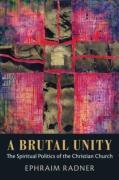
To describe the Church as "united" is a factual misnomer--even at its conception
centuries ago.
Ephraim Radner provides a robust rethinking of the doctrine of the church in light of
Christianity's often violent and at times morally suspect history.
He holds in tension the strange and transcendent oneness of God with the necessarily temporal and political function of the Church, and, in so doing, shows how the goals
and failures of the liberal democratic state provide revelatory experiences that greatly enhance one's understanding of the nature of Christian unity.
Reviews
"Radner'sA Brutal Unityis at a book of startling insight, extraordinary erudition,
and is replete with theological implications. His ability to help us see connections
between Christian disunity and liberal political theory and practice should command the
attention of Christian and non-Christian alike.A Brutal Unityis a stunning achievement."
--Stanley Hauerwas, Gilbert T. Rowe Professor of Theological Ethics, Duke Divinity School
"Massively learned and beautifully written, this book has to be the best work ever
written against the holiness and unity of the Church by a Christian theologian. Not
one to mince words, Radner presents Judas as the mirror of the faithless, violent, and
fractured Church. For Radner, the failure of liberalism arises from and reflects the
failure of the Church to repent. But he does not end here: he argues that in God's
creation of things separate from God, and in Christ's radical giving of himself, we find
God's holiness and oneness as a gift for God's people and as an invitation to imitate
God's asymmetrical giving. Those who disagree with Radner will thank him for pressing us to examine anew why Christians rightly confess the Church to be one and holy."
--Matthew Levering, University of Dayton




